The 13 Best Hyaluronic Acid Serums for Next-Level Hydration, Reviewed by Editors
Dry skin struggles? Consider 'em solved.
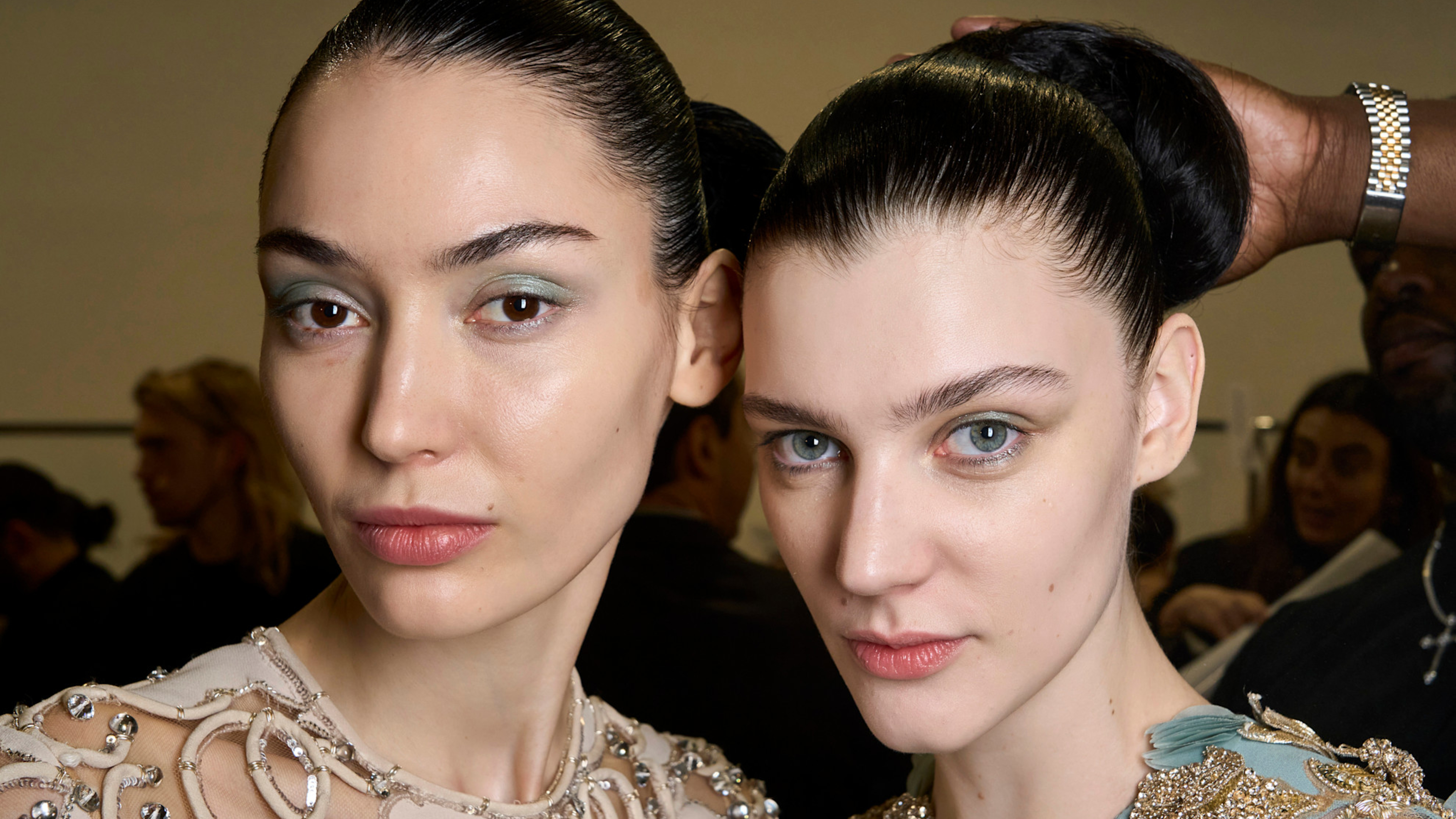

My dry skin hates to see winter coming—and it doesn't hesitate to let me know. The same goes for long flights that zap all the moisture from my complexion, cranking up the heat too high at home, or going a little too hard on exfoliating acids or retinoids. All of the above leave my face thirsty for moisture. My solution is incorporating the best hyaluronic acid (HA) serums into my dry skin routine.
HA is a hydrating powerhouse categorized as a humectant, meaning it draws water into the skin to provide the moisture it desperately needs—and a serum is one of the most effective ways to deliver it. "Hyaluronic acid is found naturally in our skin, where it holds water and helps to keep the skin hydrated, dewy, and plump," says board-certified dermatologist Hadley King, MD FAAD. "Because it is a powerful humectant, hyaluronic acid is a great topical hydrator."
She explains that the key is ensuring your environment is humid enough to gather moisture (translation: apply hyaluronic acid to slightly damp skin) or pairing it with "emollients and occlusives to lock in the hydration so it doesn't pull water out of the skin." An emollient option? Your favorite moisturizer. And an occlusive? A slugging balm.
To create this guide, I tested dozens of hyaluronic acid serums and consulted with three board-certified dermatologists—Dr. King, Karan Lal, MD, and Kristina Collins, MD—to narrow hundreds of options down to a streamlined, less-overwhelming list of 15. Plus, don’t miss the FAQ section at the end, where we tackle your most pressing questions about hyaluronic acid serums, including how to use them in your routine, whether you actually need one, and more.
Best Hyaluronic Acid Serums
- Best Hyaluronic Acid Serum Overall: SkinCeuticals Hyaluronic Acid Intensifier
- Best Drugstore Hyaluronic Acid Serum: L'Oréal Paris Revitalift 1.5% Pure Hyaluronic Acid Face Serum
- Best Hyaluronic Acid Serum With Ceramides: StriVectin Multi-Action Hydration Multiplier Hyaluronic Acid Serum
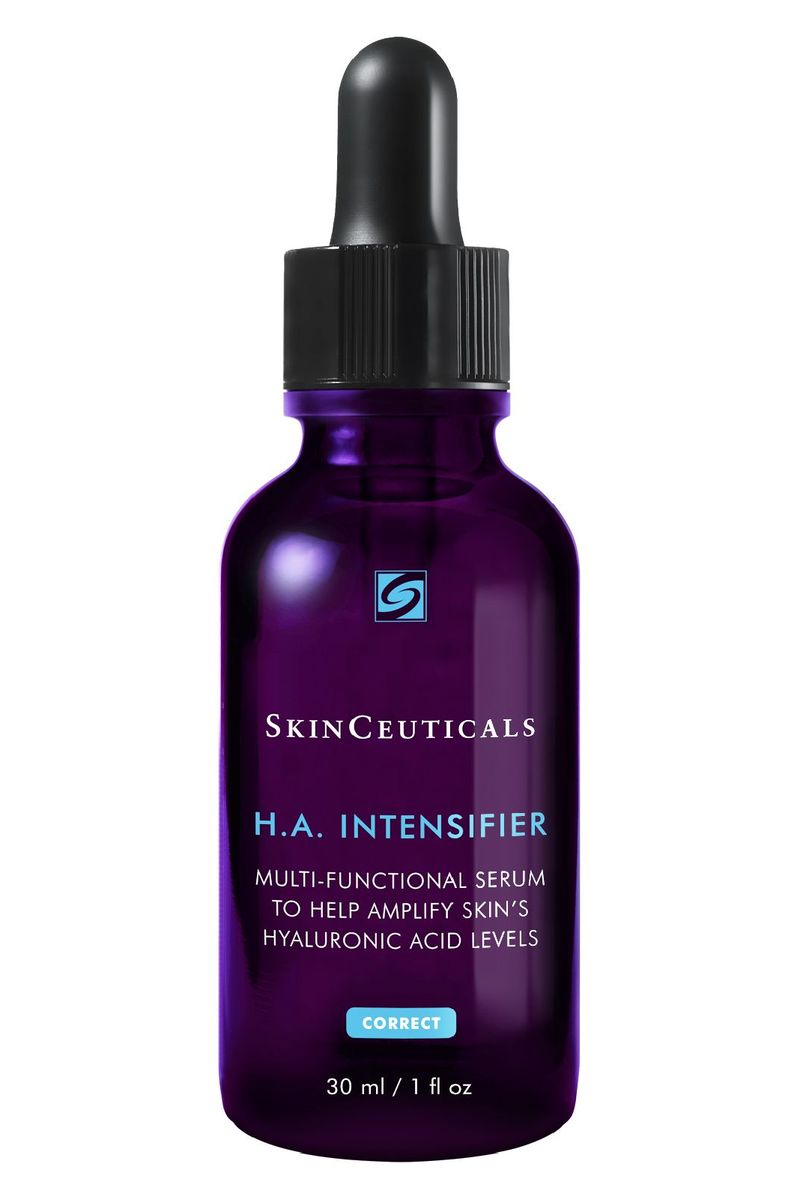
In nearly a decade as a beauty editor, I’ve seen SkinCeuticals maintain its status as one of the most trusted and popular skincare brands, especially when it comes to serums. This newly reformulated HA serum combines—you guessed it!— hyaluronic acid with soybean ferment extract, which helps increase glycosaminoglycan (GAG) levels. Translation: It replenishes your skin’s hyaluronic acid while boosting other key glycans that support hydration, elasticity, and a youthful-looking glow. I could go on about the science (it’s fascinating, trust me), but its title as the best overall hyaluronic acid serum speaks for itself. Read on for my full review and other details to know before adding it to your cart.
Size: 1 fl oz
Key Ingredients: Hyaluronic acid and proxylane (hydrating), licorice root extract and purple rice extract (prevent hyaluronic acid degradation)
Who It’s For: Those with dry skin and/or fine lines
What We Love: Hydrating and plumping benefits are backed by a clinical study, contains licorice root and purple rice extract to prevent hyaluronic acid degradation, can be used after dermal filler injections
What We Don’t: Some reviewers experienced pilling when layered under other products
Review for MC: “SkinCeuticals has always been my go-to for skincare products that deliver results, and this product is right up there with C E Ferulic as one of my MVPs. While it’s not a constant in my routine (it’s more of a splurge), it’s the one I rely on to get me through the harsh winter months, when my skin is at its driest, dullest, and flakiest. (Trust me, I could keep going with the adjectives, but you get the picture.) After a few months of use, it feels like my skin has undergone a total hydrating transformation—with the bonus of visibly improved fine lines." — Marisa Petrarca, Contributing Beauty Writer
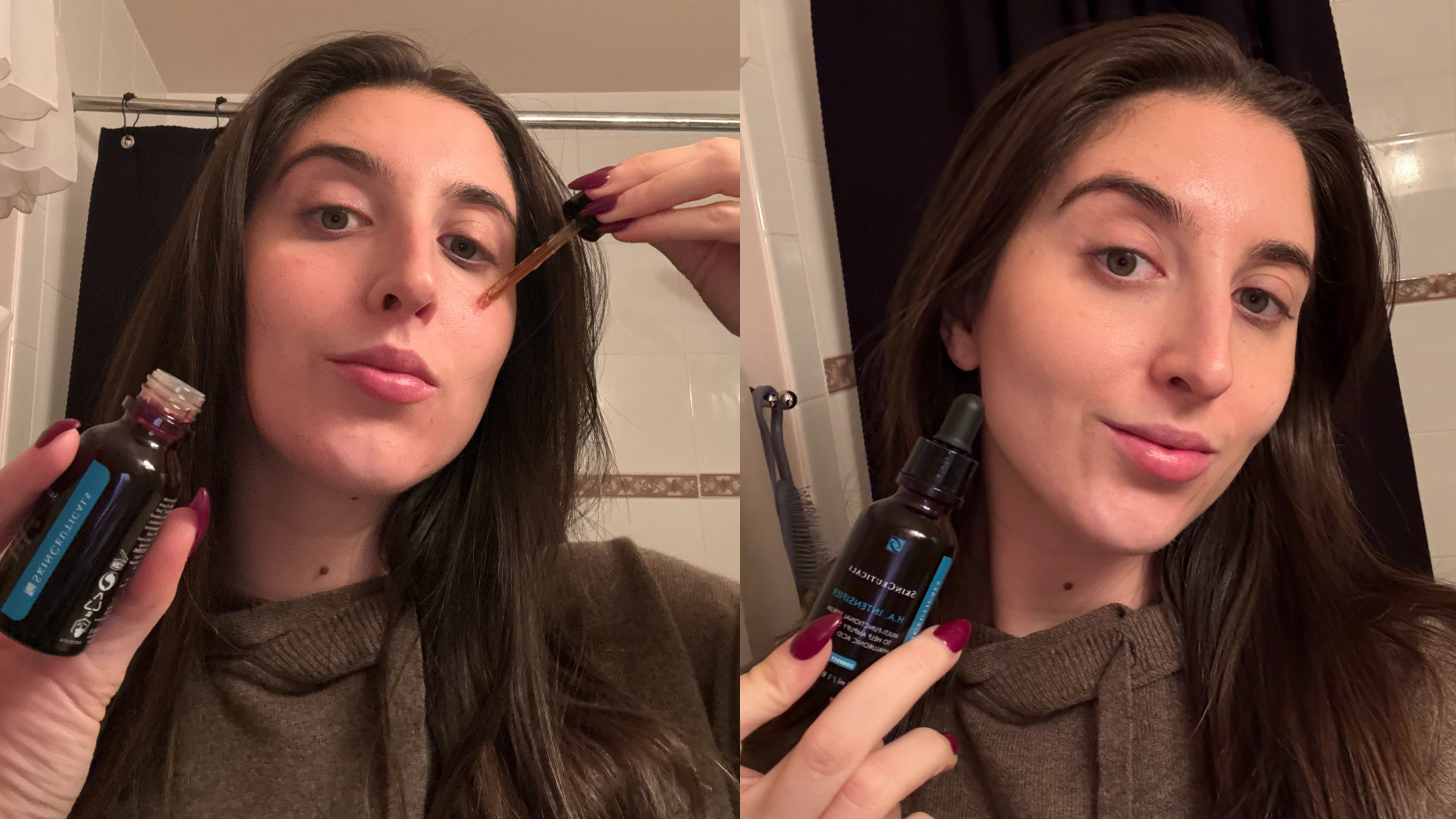
Contributing beauty writer Marisa Petrarca uses SkinCeuticals Hyaluronic Acid Intensifier.
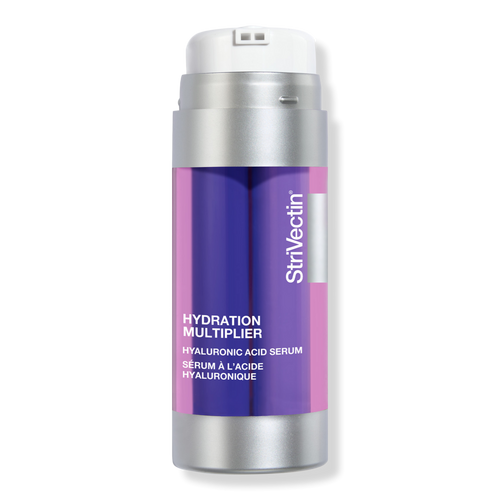
I’m a big fan of skincare products that break the mold, and this one from StriVectin does exactly that. As you can see in the photo, it features a dual-chamber design, so it’s essentially two products in one. Press down evenly on the pump to mix the formulas: one side houses a hyaluronic acid serum packed with humectants, including seven types of hyaluronic acid and hydrating polyglutamic acid. The other side contains a lotion-like serum infused with five types of ceramides to lock in all that moisture.
Size: 1 fl oz
Key Ingredients: Hyaluronic acid, polyglutamic acid and ceramides (hydrating)
Who It’s For: Dry skin
What We Love: Dual-chamber design with humectants on one side and emollients on the other; boasts seven types of hyaluronic acid; cruelty-free
What We Don’t: Contains fragrance
Review for MC: “I was hoping this hyaluronic acid serum would live up to its unique packaging—and it absolutely delivered. The dual-chamber design is my favorite feature. It keeps the hyaluronic acid-based formula and the lotion-like ceramide blend separate until you dispense and mix them together for optimal potency. Not only is the process oddly satisfying, but the product itself feels super luxurious on my skin. Best of all, it leaves my complexion looking dewy and radiant as soon as the next morning." — Marisa Petrarca, Contributing Beauty Writer
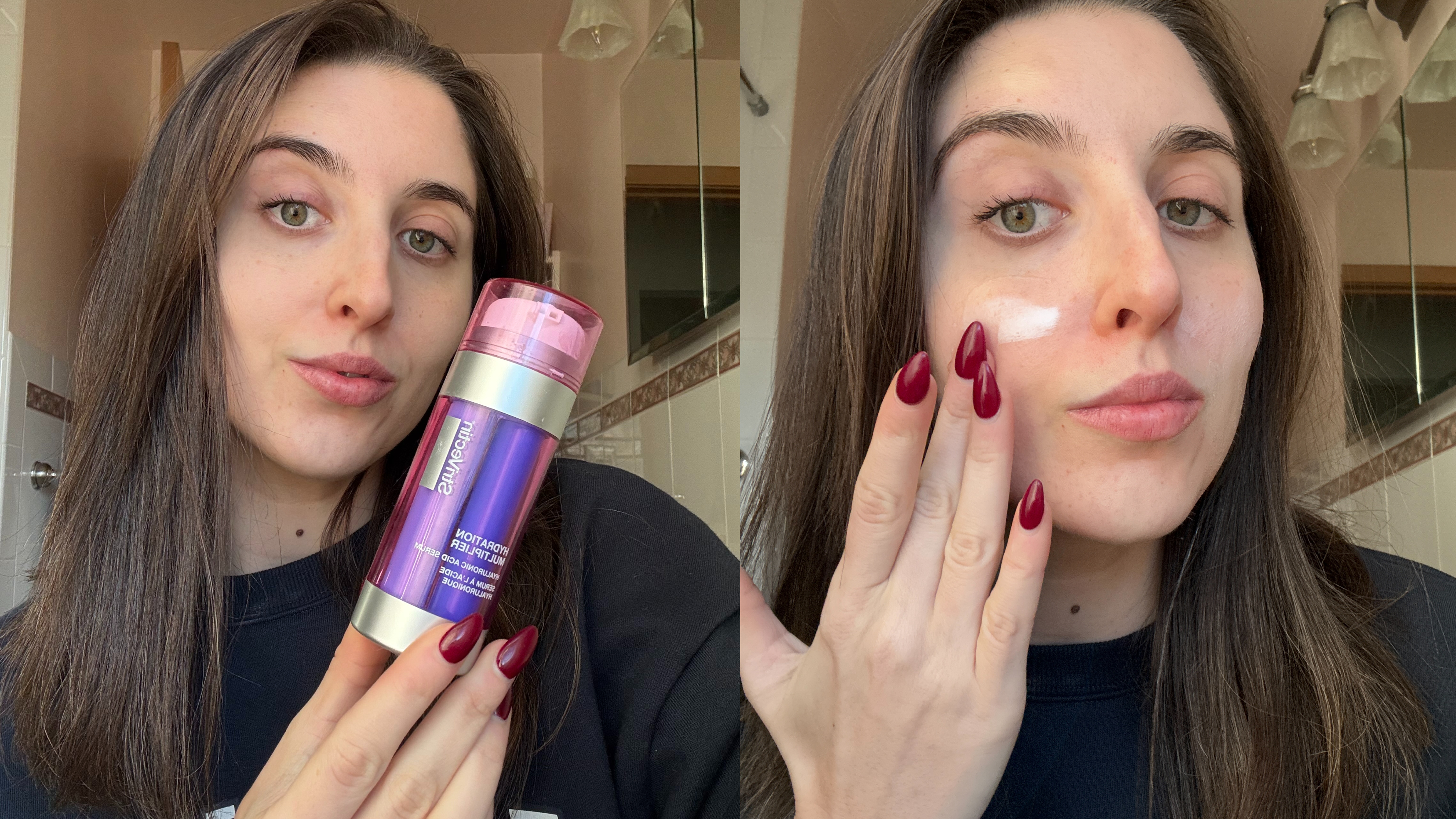
Contributing beauty writer Marisa Petrarca uses Strivectin Hydration Multiplier Hyaluronic Acid Serum.
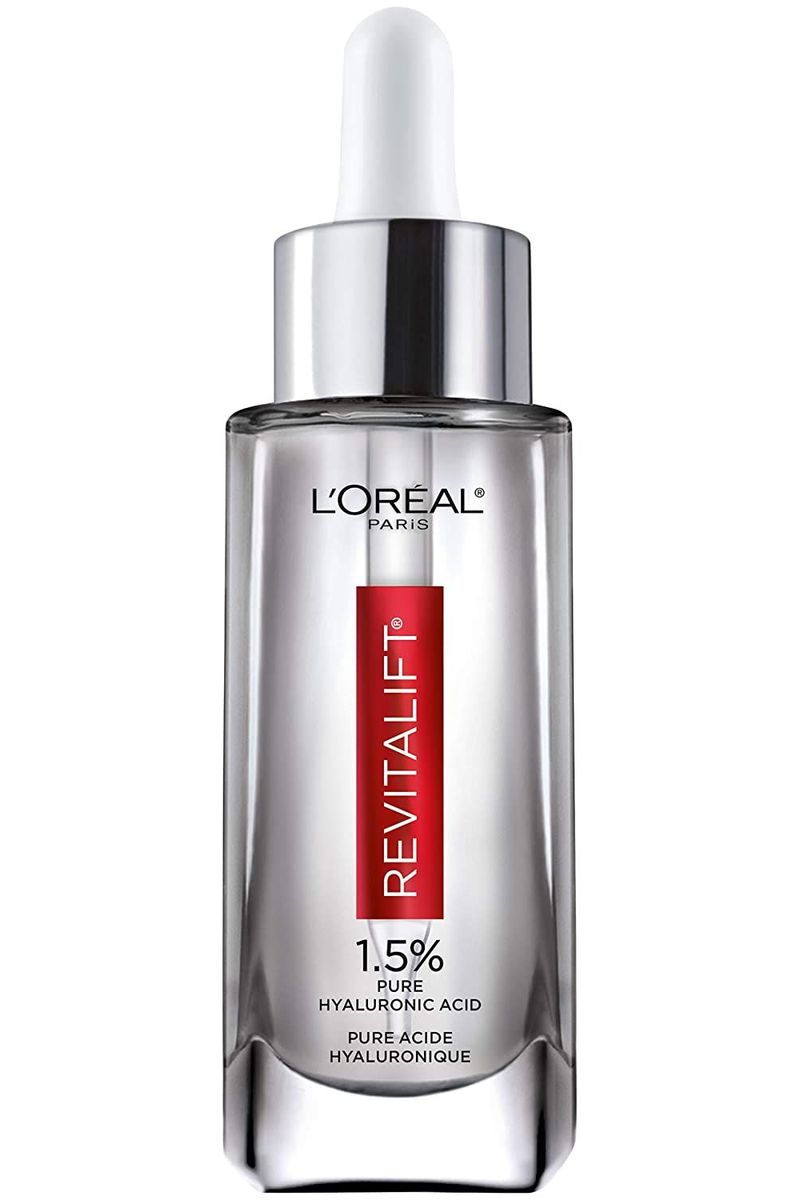
Here’s your daily reminder not to sleep on drugstore skincare. With over 30,000 five-star ratings, this product has cemented itself as a favorite for delivering hydration and plumping at a price that feels almost too good to be true. Its formula uses high and low-molecular-weight hyaluronic acid to provide hydration at both the surface level and deeper layers of the skin. Plus, it uses ascorbyl glucoside, a stable form of Vitamin C that brightens and protects with antioxidant benefits.
Size: 1 fl oz
Key Ingredients: Hyaluronic acid in two forms and glycerin (hydrating), vitamin C (antioxidant and brightening)
Who It’s For: Those with dry skin, dullness, and/or fine lines
What We Love: Has tens of thousands of five-star ratings; absorbs quickly; contains a stable form of brightening vitamin C
What We Don’t: Some find the watery texture difficult to apply
Review for MC: “While I love indulging in a good skincare splurge now and then, I also cling to amazing drugstore finds like they’re my children—and this serum is one of them. It checks every box you could ask for in a tried-and-true hyaluronic acid serum, with the added bonus of vitamin C to gradually brighten the inevitable dullness that winter brings to my complexion." — Marisa Petrarca, Contributing Beauty Writer
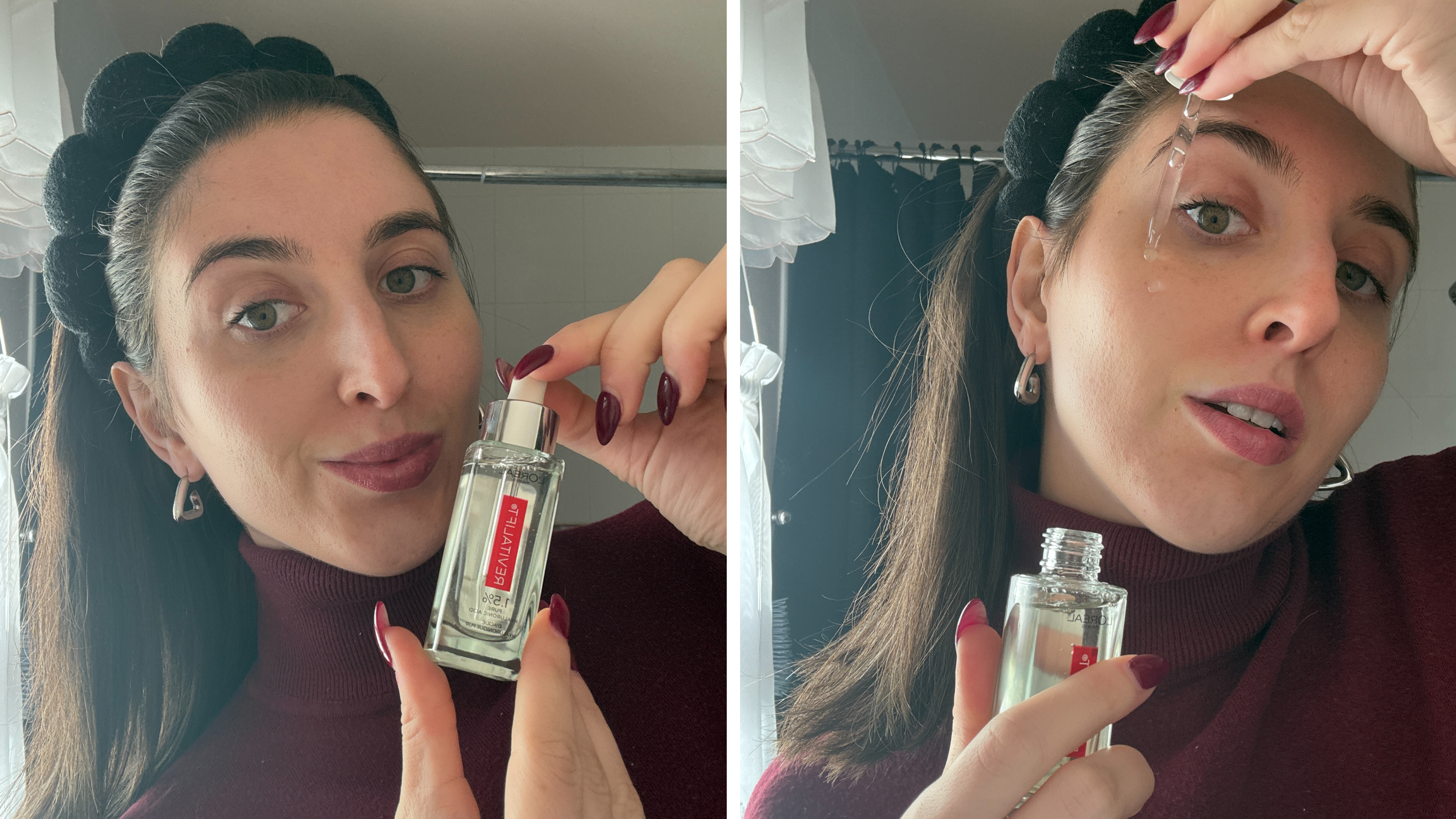
Contributing beauty writer Marisa Petrarca uses L'Oréal Paris Revitalift 1.5% Pure Hyaluronic Acid Face Serum
Other Hyaluronic Acid Serums I Love
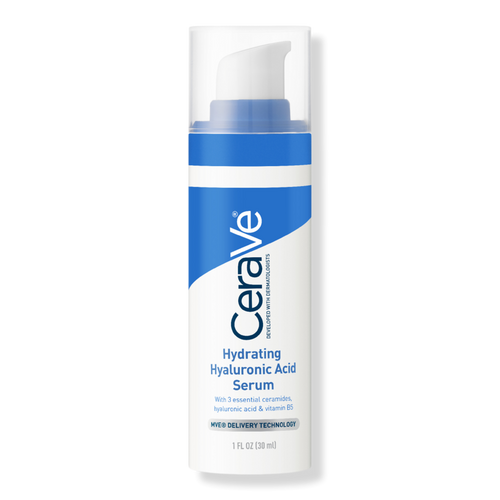
You might know CeraVe as one of the most popular drugstore skincare brands—and for good reason. But our obsession with it goes a bit deeper. Every formula, including this top-rated hyaluronic acid serum, is powered by ceramides, lipid molecules that lock in moisture, protect your skin, and strengthen its barrier. In this serum, ceramides team up with hyaluronic acid, which pulls hydration into the skin, while the ceramides seal it in to hydrate dry skin in no time.
Size: 1 fl oz
Key Ingredients: Hyaluronic acid and ceramides (hydrating), panthenol (soothing)
Who It’s For: Dry skin
What We Love: Fragrance and essential oil-free; wears well under makeup
What We Don’t: Contains denatured alcohol, which may be irritating to some
Customer Review: "This is my 1st time purchasing this & so far, I love it. I've been using this for a week & can already see & feel the difference in my skin. I have dry, sensitive skin & this ointment gets the job done without being overly greasy." — Ulta Beauty
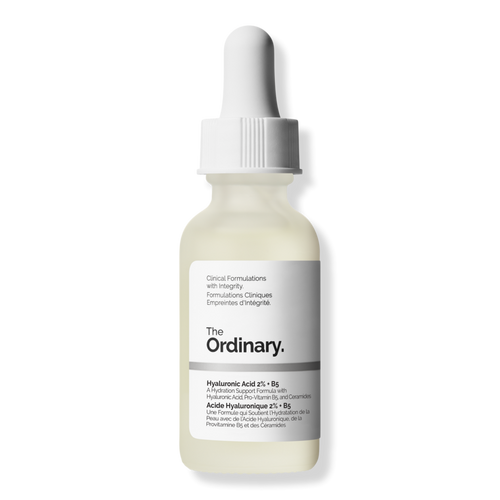
Since its debut in 2013, The Ordinary has earned its reputation as a go-to budget-friendly skincare brand, thanks to its potent, no-nonsense ingredient lists. Take its cult-favorite hyaluronic acid serum, for example. It's formulated with multiple forms of hyaluronic acid to deliver hydration that works on your skin’s surface and deep below. Its multi-layer approach may help extend the plumping effect compared to serums with fewer forms of HA.
Size: 1 fl oz
Key Ingredients: Hyaluronic acid (multiple forms) and ceramides (hydrating), panthenol (soothing)
Who It’s For: Dry skin
What We Love: Most budget-friendly serum on our list; comes in two sizes; uses multiple forms of hyaluronic acid
What We Don’t: Some users mention that the serum can feel a bit sticky at first
Customer Review: "Is there a possibility that your skin could go through withdrawals not using a certain product? Because it sure feels like when I don't have this on my skin, it feels thirsty. I swear by this stuff and it's like magic. I try to use it at night as well so I wake up with beautiful skin that looks hydrated and bouncy." — Ulta Beauty
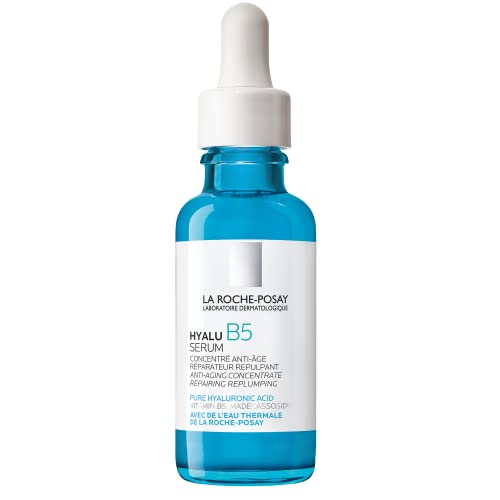
This serum is the perfect balance between hydrating and soothing, thanks to a blend of humectants like hyaluronic acid and glycerin, paired with calming ingredients such as the brand’s proprietary thermal water and, true to its name, panthenol. While it may not be ideal for sensitive skin types that can’t tolerate fragrance, it’s garnered a bevy of five-star reviews from users with typically reactive skin.
Size: 1 fl oz
Key Ingredients: Hyaluronic acid and glycerin (hydrating), panthenol and La Roche-Posay Prebiotic Thermal Water (soothing), madecassoside (antioxidant and soothing)
Who It’s For: Those with dry and/or dull skin
What We Love: Lightweight; oil-free, contains soothing and healing panthenol (aka vitamin B5);
What We Don’t: A handful of shoppers noted that the glass dropper broke in transit
Customer Review: "Started using it for about 2 months already in the mornings and night and my skin is amazing! I use it before wearing foundation and my make up looks flawless and clean all day long. I have very sensitive skin and works perfect! I use the whole routine from La Roche-Posay and it’s fantastic!! — Amazon
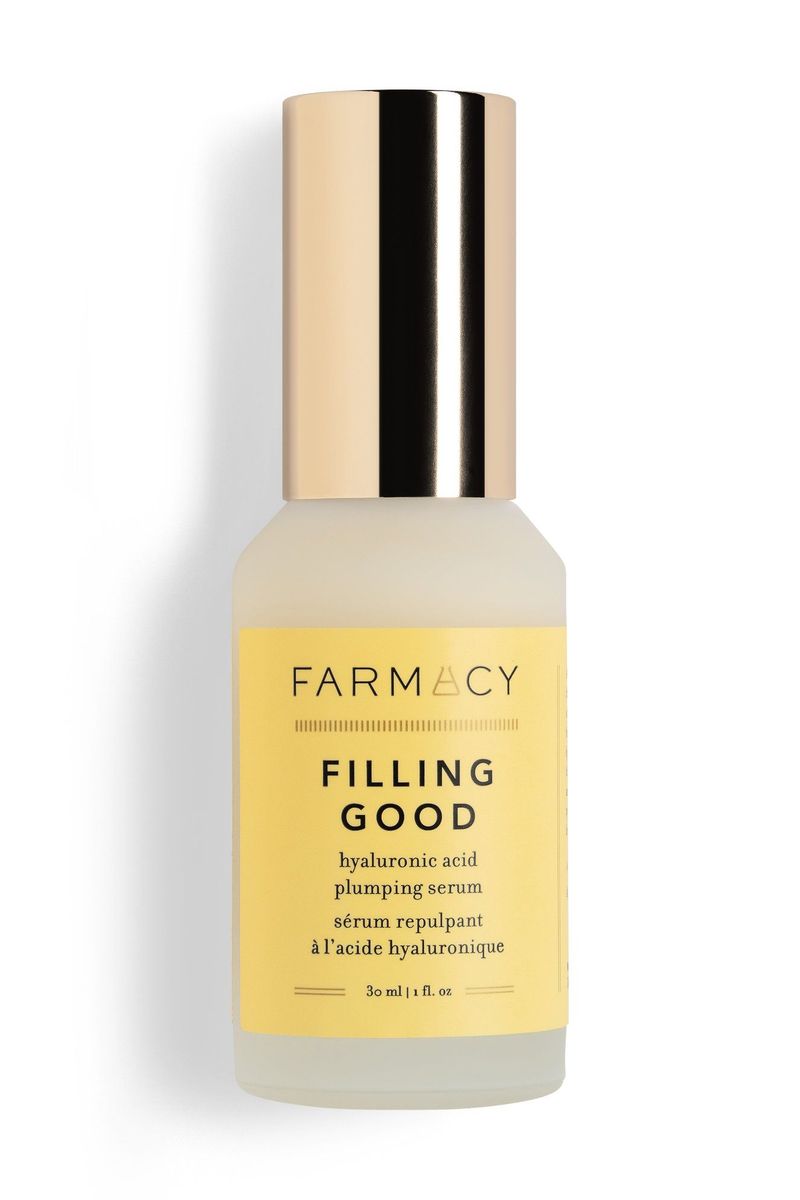
If smoothing fine lines tops your skincare checklist, Farmacy’s Filling Good serum is worth considering. The hyaluronic acid delivers an instant boost of hydration for a temporary plumping effect, while vegan collagen works over time to firm your skin with consistent use. The most unique ingredient of all is encapsulated thyme extract, which, according to the brand, has been clinically shown to reduce smile lines and crow’s feet in just 60 days.
Size: 1 fl oz
Key Ingredients: Hyaluronic acid in multiple forms (hydrating and plumping), vegan collagen (hydrating), encapsulated thyme extract (smoothing)
Who It’s For: Dry skin, fine lines and wrinkles
What We Love: Visibly plumps fine lines, wears well under foundation; leaves a glowy finish
What We Don’t: Reviewers have mixed opinions on its honey scent
Customer Review: "This is an absolutely fantastic hyaluronic acid serum! It feels so plumping and hydrating on the skin. I’ve noticed a significant decrease in fine lines after using it the first few times. It also smells like honey! — Sephora
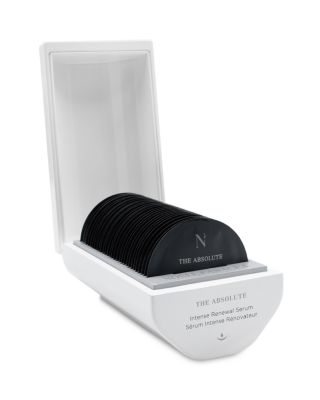
The first product I ever tried from Noble Panacea was the brand's Overnight Recharge Cream. I’ll admit, I was skeptical at first—the price tag is steep—but I quickly fell in love with its ultra-luxurious, silky texture and the perfectly portioned "doses" that make it a dream for travel. While I haven’t yet scooped up this new launch, I’m eager to, thanks to its power-packed ingredient list. These serum packets are ideal for anyone seeking more than just hydration—think exfoliation enthusiasts, those targeting signs of aging, or anyone ready to give their skin some serious TLC.
Size: 7 "doses"
Key Ingredients: Hyaluronic acid and ceramides (hydrating), retinol and glycolic acid (exfoliating), teprenone (antioxidant), niacinamide (anti-acne, brightening, and firming)
Who It’s For: Those with dry, dull, and/or aging skin
What We Love: If you don't love it, the brand promises a full refund; contains power-packed exfoliants; ideal for travel
What We Don’t: Most expensive option on our list
Customer Review: "This is my third purchase of this serum and I love that each usage is individually packaged. My favorite thing is that it is a "clean" product. Since I have a genetic condition, it is best for me to use clean products. I do like the feel of this serum and how well it absorbs into my skin. The only negative is the cost but because of this, I get two applications from each applicator." — Bloomingdale's
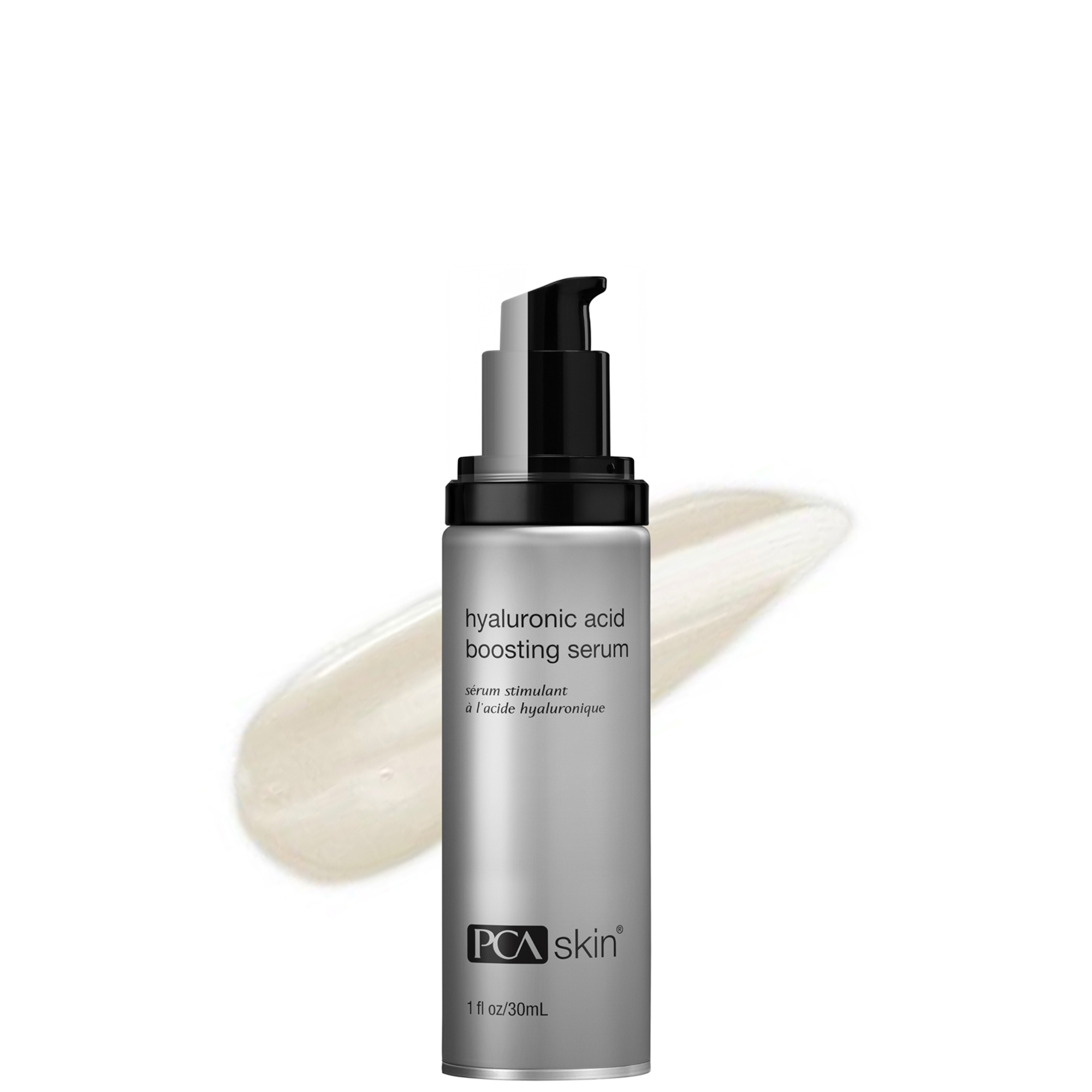
I’m a little eagle-eyed when it comes to scouting skincare products, and I’ve noticed PCA Skin on the shelves of dermatologist offices more often than not, which tells me it’s a staple in the dermatology world. This serum combines multiple forms of hyaluronic acid to flood your skin with hydration, while niacinamide works double duty to strengthen your skin barrier and keep all that moisture from escaping.
Size: 1 fl oz
Key Ingredients: Hyaluronic acid (multiple forms) and ceramides (hydrating), niacinamide (anti-acne, brightening, and firming)
Who It’s For: Those with dry skin and/or fine lines
What We Love: Contains niacinamide to help brighten and firm with consistent use; part of a hydration-focused skincare line from PCA Skin, perfect if you want the full regimen; available via Amazon Prime
What We Don’t: The packaging is heavy, making it difficult to tell when you’re running low
Customer Review: "This product is seriously addicting. I use several products from the PCA SKIN line, but this product is a must. I believe it is suitable for all skin types, considering I use it and so does my mother-in-law. I have oily skin with occasional flaking, and this product has solved my issue with flakiness." — Amazon
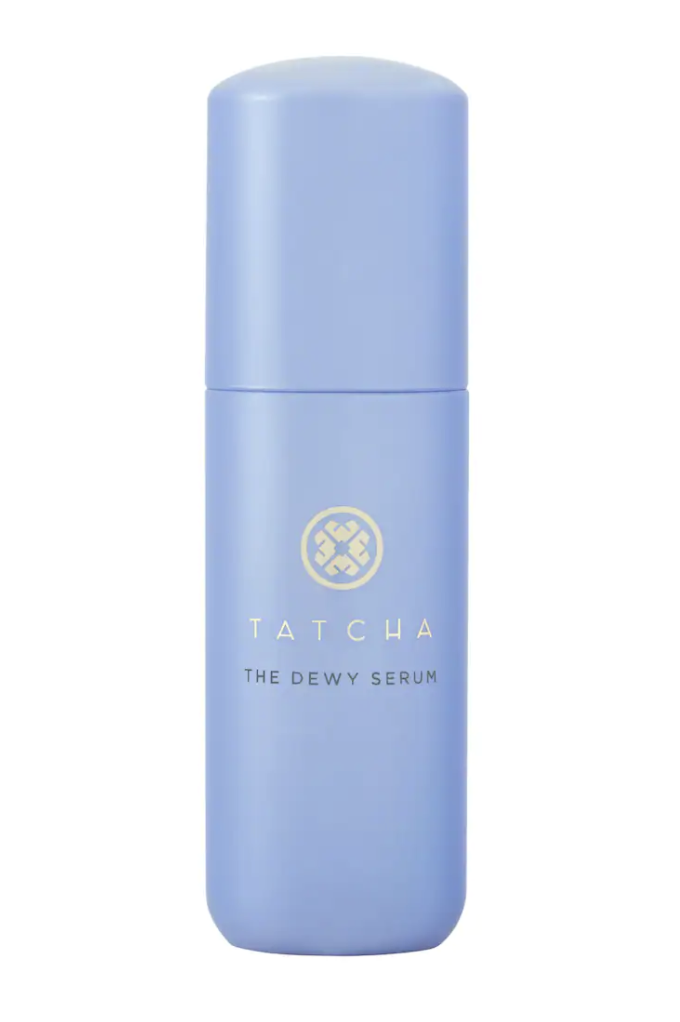
This serum is more than just a pretty bottle for your vanity—it’s a potent multitasker for your skin. The formula hydrates with hyaluronic acid and squalane while gently exfoliating to smooth the appearance of fine lines and uneven texture with regular use. At the core of its exfoliating benefits is Tatcha’s exclusive Hadasei-3 complex, a blend of fermented Japanese superfoods that naturally generate skin-smoothing lactic acid.
Size: 1 fl oz
Key Ingredients: Hyaluronic acid and squalene (hydrating) and Hadasei-3 complex (exfoliating)
Who It’s For: Those with dry skin and/or those with uneven texture
What We Love: Uses lactic acid from Japanese superfoods to improve skin texture; Clean at Sephora; fast results
What We Don’t: Not for those sensitive to fragrance, alcohol, or heavy oils
Customer Review: "I have finally found a serum that feels as good as the benefits it provides. This has a lovely consistency, glides on smoothly and feels hydrating. I like that it contains lactic and hyaluronic acids, as well as, squalane, all three powerhouse ingredients for smoothing and hydrating. Squalane especially fights skin damage and has been a proven detoxifier. I've been using for more than a month and its the only thing in my routine that I've changed, so I know the textural difference I'm seeing (and feeling) is due to this serum." — Sephora
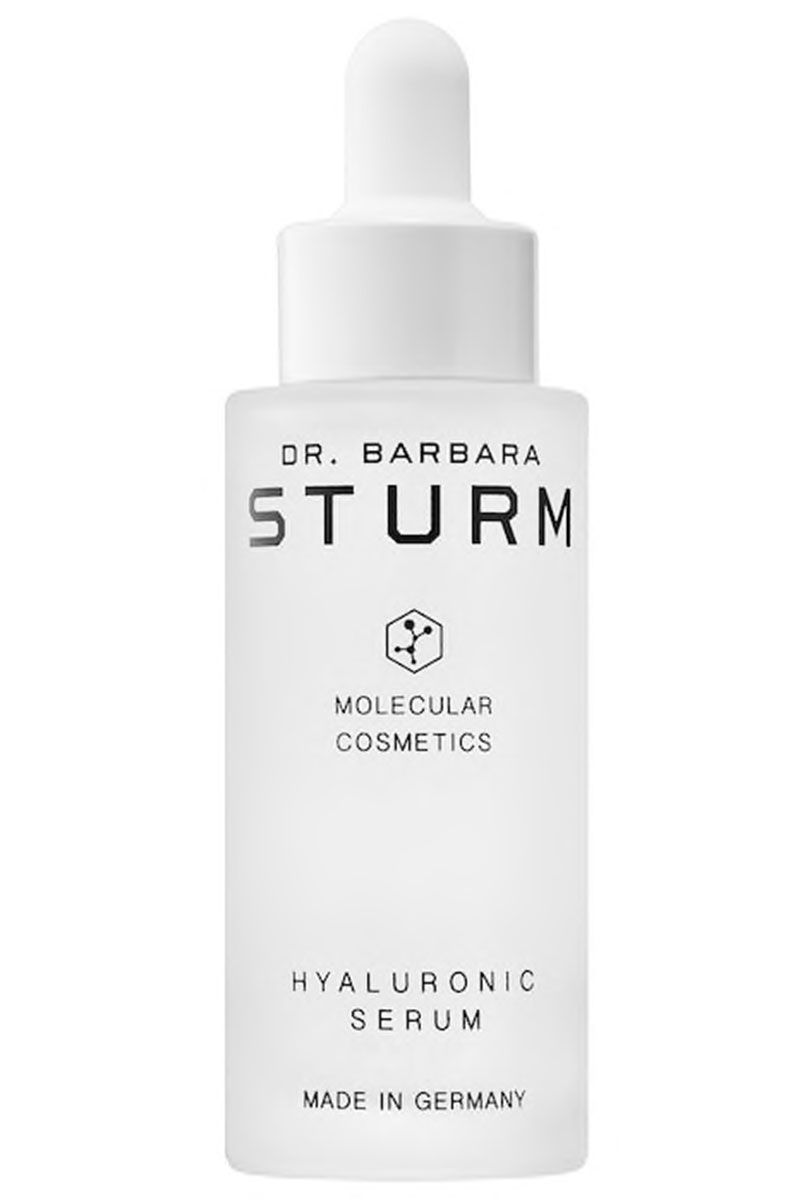
Don't let the "best hyaluronic serum for mature skin" label fool you; this one has also stolen the hearts—and coveted spots in beauty cabinets—of those with dry, sensitive skin, too. The formula uses low and high-molecular-weight hyaluronic acid for multi-layer hydration, plus purslane, an antioxidant known for its calming and irritation-reducing properties. That's not all: a 2023 study on mice exposed to UVB radiation found that purslane boosted hyaluronic acid levels and improved the skin's ability to repair and prevent damage. What that means for you is that it doesn't just hydrate—it actively helps fortify your skin against stressors, too.
Size: 1 fl oz
Key Ingredients: Multiple forms of hyaluronic acid (hydrating) and purslane (antioxidant)
Who It’s For: Those with dry, mature, and/or sensitive skin
What We Love: Comes in a mini size that's ideal for trialing; uses purslane to protect your skin from stressors, among other benefits; boasts both low and high-molecular-weight hyaluronic acid
What We Don’t: Pricey
Customer Review: "This has to be the best hyaluronic serum I have ever used. After only 1 week of use, I have noticed a significant difference in my skin tone and moisture. Also, my fine lines are nearly gone. This is definitely an investment product, but a tiny bit goes a long way." — Sephora
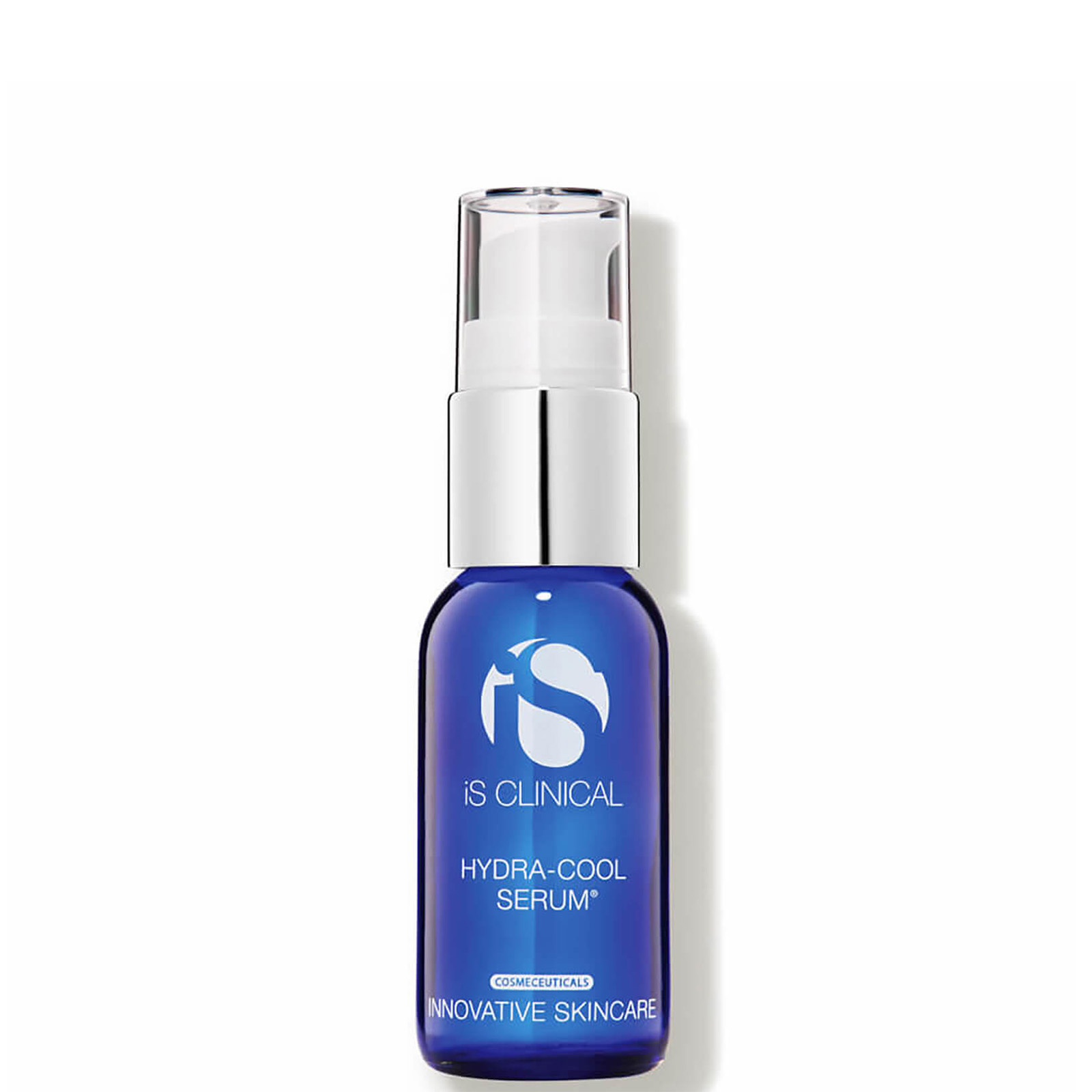
Not to obsess over the “not all hyaluronic acids are created equal” mantra, but it’s worth repeating, especially when talking about this serum from iS Clinical. Sure, it hydrates the skin (as you’d expect), but it also works overtime to calm redness and tame breakouts. The formula pairs hyaluronic acid with soothing vitamin B5, redness-reducing centella asiatica, antimicrobial mushroom extract, and a touch of menthol for an instant, refreshing cooling effect.
Size: 1 fl oz
Key Ingredients: Hyaluronic acid (hydrating), panthenol, menthol, and centella asitica (soothing), mushroom extract (antimicrobial)
Who It’s For: Dry, blemish, or redness-prone skin
What We Love: Non-comedogenic, calms irritated skin, refreshing cooling sensation thanks to menthol
What We Don’t: Menthol’s cooling sensation may irritate extremely sensitive or reactive skin
Customer Review: "I have mild rosacea symptoms and, after using this product, have had excellent results minimizing the visibility of the redness. It has also acted to minimize other skin blemishes and leaves my skin feeling soft and smooth." — Amazon
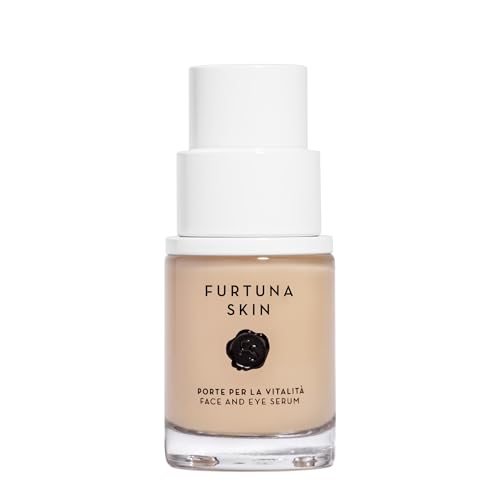
I wasn’t clued into the glow-enhancing magic of this Italian-born skincare line until I experienced a super-luxurious facial featuring its products—and I’ve been hooked ever since. This lightweight, depuffing serum is a personal favorite because it's formulated to hydrate and soothe both the face and under-eyes. It’s packed with hydrating hyaluronic acid and emollient olive oil, plus soothing botanicals and antioxidants that calm redness and protect against environmental stressors.
Size: 1 fl oz
Key Ingredients: Hyaluronic Acid and squalene (hydrating), olive oil (soothing, antioxidant-rich), organic beet extract (soothing, improves skin texture), organic chicory extract (strengthens moisture barrier, reduces puffiness)
Who It’s For: All skin types
What We Love: Environmental Working Group Verified; ingredients are sustainably sourced from the brand's private organic farm in Sicily; bursting with antioxidants
What We Don’t: If you’re looking to target more advanced signs of aging, you might need stronger actives like retinol or peptides for firming and lifting
Customer Review: "This product is divine. It softens my skin and gives it a lovely sheen. I have sensitive skin - dry but prone to breakouts - and I've had nothing but lovely results since using this serum. It calms any redness and seems to diminish my fine lines, as well. I have been using it along with the Micellar and Essence Read more about review stating Really Lovely SerumOil as my ONLY skin care for about six weeks now and I can definitively say that this is all I'll be using in the future." — Furtuna
What Is Hyaluronic Acid?
"Hyaluronic acid is a sugar molecule that is abundant in our skin and in many tissues," explains Dr. Lal. "It helps provide integrity and hydration to the skin." Contrary to the name, it's not an exfoliating acid, like what you would find with glycolic or lactic acid. Instead of drying and resurfacing, it does the opposite. "It attracts water and is thus used in skincare products to help hydrate the skin," adds Dr. Lal.
Do I Need a Hyaluronic Acid Serum?
Hyaluronic acid might not be an absolute must-have in your skincare routine, but it could be a game-changer in restoring hydration to parched skin and giving fine lines a temporary plump. “Those with dehydrated skin will benefit the most,” explains Dr. King.
“Anyone looking to (temporarily) improve the texture/plumpness/dewiness of the skin will notice that a topical hyaluronic acid (when used with emollients and occlusives) will temporarily increase the hydration of the skin, helping it look smoother and plumper," she adds.
Is There a Downside to Hyaluronic Acid?
There’s one very important thing to keep in mind when using hyaluronic acid: "If you are in a dry environment and you don't use hyaluronic acid in conjunction with emollients and occlusives, then topical hyaluronic acid can pull water out of the skin and lose this moisture into the air, resulting in skin that is more dehydrated." In other words, it can have the opposite effect.
How Do I Add a Hyaluronic Acid Serum to My Skincare Routine?
Incorporating a hyaluronic acid serum into your routine is refreshingly simple. "In general, it's best to apply skincare products from lightest to heaviest," explains Dr. King. With that in mind, she recommends applying a hyaluronic acid serum "after cleanser, essence and toner, and before oil, moisturizer, sunscreen, and makeup."
It’s also gentle enough for daily use (though that can depend on any additional ingredients in your serum). “When used properly, a hyaluronic acid serum should not be irritating, so daily use is fine,” Dr. King continues. “I recommend a small amount (e.g. one pump) because it will spread easily and won’t leave the skin feeling sticky. Follow right away with a moisturizer that contains emollients and occlusives.”
Why Trust Us?
Marie Claire is an expert in skincare, having covered topics ranging from the best products to fight rosacea and de-puffing eye creams that actually work, to deep dives into what to know before getting filler and reviews of innovative aesthetic treatments (yes, even salmon sperm injections).
Beauty Writer Marisa Petrarca brings nearly a decade of expertise to this story and has tested countless hydrating products, including hyaluronic acid serums. For this story, she consulted three board-certified dermatologists.
How We Tested
For this story, we sourced editor favorites and tested over 15 hyaluronic acid serums. We evaluated each serum based on texture, ingredients, and results after two weeks.
Meet the Experts

Hadley King, MD is a board-certified dermatologist who specializes in medical and cosmetic dermatology. She is also a Clinical Instructor of Dermatology at the Weill Medical College of Cornell University. Dr. King graduated magna cum laude from Harvard College with a degree in biochemistry. She received her MD from Columbia University. She trained in medicine at Greenwich Hospital, affiliated with the Yale University School of Medicine, and completed her dermatology residency at the Weill Medical College of Cornell University. After residency, Dr. King worked as an attending physician at Memorial Sloan-Kettering Cancer Center, during which time she specialized cutaneous oncology and photodynamic therapy. She also has a background in immunology and her research has been published in a variety of medical journals, including the Journal of the American Medical Association.

Originally from New York City, Karan Lal, DO, grew up in Queens and attended Hunter Science High School in Manhattan. He graduated summa cum laude from the New York Institute of Technology, where he completed a rigorous seven-year accelerated combined medical program. He was selected to be an academic medical scholar, during which he received a Master of Science in neuroscience and a scholarship for three years of medical school and graduate training. He was elected to the Sigma Sigma Phi and Psi Sigma Alpha medical honor societies. He completed his internal medicine internship at the University of Connecticut Medical Center where he was elected intern of the year. He completed a three-year dermatology residency at the University of Massachusetts, where he was elected chief resident. He continued at the University of Massachusetts to complete a pediatric dermatology fellowship, where he gained an interest in vascular anomalies, pediatric laser, and dermatologic surgery of pediatric patients. Dr. Lal specializes in pediatric and adult dermatology, laser surgery, soft tissue filler augmentation, body sculpting, melanocyte keratinocyte transplant surgery for vitiligo and hypopigmentation, pigmentary abnormalities of the skin and enjoys treating patients from birth onwards. He is an expert in atopic dermatitis, vitiligo, melasma, psoriasis, and hidradenitis and has worked in specialty clinics among experts.

Kristina Collins, MD, is a board-certified dermatologist specializing in Mohs micrographic surgery, as well as surgical and cosmetic dermatology. She graduated Summa cum Laude with dual degrees in Microbiology and Political Science from the Barrett Honors College at Arizona State University. She was awarded the prestigious Canby Robinson Scholarship and earned her M.D. from Vanderbilt University School of Medicine, graduating as valedictorian. She was also named Tennessee Woman in Medicine of the Year for co-founding Shade Tree Family Clinic, a free medical clinic that continues to serve thousands of uninsured patients in Nashville each year.
Dr. Collins completed her dermatology residency through the Harvard Combined Dermatology Program, gaining experience at top hospitals, including Massachusetts General, Brigham and Women's, and Boston Children's. She further honed her expertise with a fellowship in Mohs Micrographic Surgery and Procedural Dermatology at the Lahey Clinic and Harvard Dermatology, specializing in skin cancer treatment, reconstruction, laser surgery, and cosmetic procedures. During her fellowship, she also served as a clinical instructor at both Harvard Department of Dermatology and Tufts University.
Get exclusive access to fashion and beauty trends, hot-off-the-press celebrity news, and more.

Marisa Petrarca is a writer and editor based in Saint Paul, Minnesota, specializing in beauty, wellness, fashion, and lifestyle. She previously served as the Senior Beauty and Fashion Editor at Grazia USA and Beauty and Style Editor at Us Weekly. Her expertise spans breaking beauty news, shopping roundups, product reviews, and explainer articles on popular topics in skin, makeup, and aesthetics. Her work has been featured in PS, Cosmopolitan, Allure, NewBeauty, InStyle, and The Zoe Report, among others. Marisa holds a bachelor's degree in English literature from Wagner College. Follow her on Instagram @Marisa Petrarca.